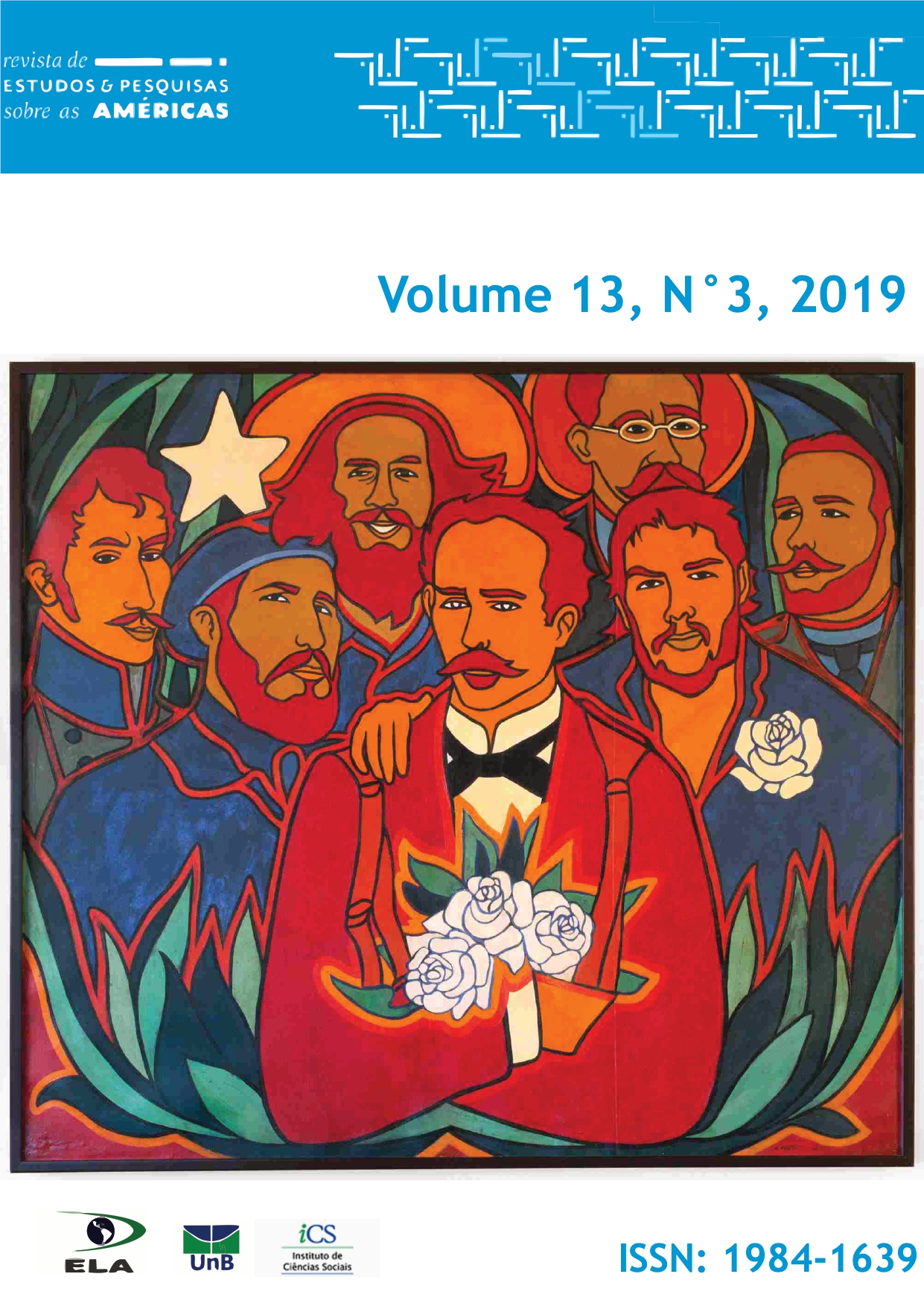A Review First Thirty Years of the Cuban Revolution From the Marti´s Thought Perspective
DOI:
https://doi.org/10.21057/10.21057/repamv13n3.2019.27374Keywords:
José Martí, Cuban Revolution, history of economic thought, Cuban philosophical thinking.Abstract
Jose Marti is considered the patron of the Cuban revolution for his intellectual and political militancy contribution. Descendant of the Cuban academic thought worried about the national independency and in dialog with the European and liberal traditions, Martí rethink the colony position of the island and propose autochthonous solutions to achieve the national sovereignty, which were referenced on the speeches and policies by the revolutionary leadership, who defeated the Batista government in 1959. Despite the recognition of Martí as the Apostol of the revolution, on the first 30 years of the revolution government, the gradual loss of influence of his thought, in comparison of the rise of the dialectical materialism, led some analysts to suggest the decrease of his political influence. The main objective of this paper is to identify the influence of José Martí´s thought on the conduction of the first 30 years of the Cuban revolution and evaluate its interaction with de political, social and economic developments. To accomplish this task, some traces of Marti’s thought will be recovered and its articulations with the formulations of the Agrarian and Urban Reform and economic planning will be highlighted.
References
ACANDA, Jorge L. Fernando Buey y la Recuperación del marxismo crítico en Cuba. In: TORRES, A. PASUCH, Márcia Cristina M. Encontros con Paco Buey. Editora UFMT: Cuiabá, 2013.
ARNAL, Salvador L. Entrevista a Jorge Luis Acanda. Papeles de relaciones ecosociales y cambios globales, nº126, 2014.
BARRERAS, Dairy; LÓPEZ, Olga; MÉNDEZ, José. GUITIÉRREZ, Robin. Carlos Marx y Rosé Martí: coincidencias en las concepciones sociopolíticas y culturales. Humanidades Médicas, nº18, v 3, 2018.
CANO, W. Soberania e Política Econômica na América Latina. Editora Unesp. São Paulo, 2000.
CASTRO RUZ, Fidel. La historia me absolverá. 1964.
_____________. The Declarations of Havana. Verso Books, 2018.
_____________. La historia me absolverá. Ediciones Colihue SRL, 1993.
ECKSTEIN, Susan. The Rectification of Errors or the Errors of the Rectification Process in Cuba? Cuban Studies, p. 67-85, 1990.
LANDAU, S. Notes on the Cuban Revolution. The Socialist Register, 1989.
LEÓN, A. S. Breve Historia de La Revolución Cubana (1959 ”“ 2000). Editorial Ciencias Sociales. La Habana, 2003.
MARTÃ, José. José Marti: Obras Completas. Editorial de Ciencias Sociales. La Habana, 1991.
____________. Mi raza. Patria, Nueva York, v. 16, p. 299, 1893.
____________. Nossa América. Editora Universidade de Brasília. Brasília, 2011.
MARTIN, Juan L. La investigación social en Cuba (1959 ”“ 1997). Temas, nº 16- 17, 1999.
MOLINA, E. M. Devenir Del Modelo Económico Socialista. Editorial de Ciencias Sociales. La Habana, 2016.
NAVARRO, José C. El desafío del yugo y la estrella. La Habana: SI-MAR SA, 2000.
PÁZ, J. V. “A Revolução Agrária Cubana: conquistas e desafios”. Estudos Avançados. v.72, n. 25, 2011
PÉREZ-LÓPEZ; J. F. “Rectification At Three: Impact on the Cuban Economy”. Studies in Comparative International Development, Fall , Vol. 25, no. 3, 1990
PÉREZ Jr. L. A. La estructura de la Historia de Cuba: significados y propósitos del passado. Editorial de Ciencias Sociales. La Habana, 2017.
RODRIGUEZ, J. L. Estratégia del Desarrollo Económico em Cuba. Editorial de Ciencias Sociales. La Habana, 1990.
RODRIGUES JÚNIOR, Mao. A revolução cubana e a questão nacional (1868-1963). Núcleo de Estudos do capital: 2007.
SANDOVAL, Orieta A; HERNANDES, Afredo A A. Las ciências sociales em la academia de ciências em Cuba (1962 -1981). Tiempos de America, nº 9, 2002.
SANTOS, Fabio Luis Barbosa dos. Origens do pensamento e da política radical na América Latina: um estudo comparativo entre José Martí, Juan B. Justo e Ricardo Flores Magón. 2011. Tese de Doutorado (História Econômica). Universidade de São Paulo.
SUCHILICK, Jaime. The political ideology of José Martí. Caribbean Studies. Vol 6. No 1, 1996.
TREFFTZ, Erich. “50 años de reforma Urbana em Cuba: em el aniversario del cambio de paradigma”. Revista INVI. v 26, nº 72. Agosto de 2001.
TRETO, Carlos A. La ciencia política en Cuba: del estancamiento a la renovación (1980 ”“ 2005). Revista de Ciencia Política de Santiago, v. 25, n. 1, 2005.
Downloads
Published
Issue
Section
License
The published material is the property of the Journal, and may be reproduced in whole or in part with indication of the source.
Copyright: Authors will be responsible for obtaining the copyright of the material used. Authors who publish in this journal agree to the following terms:
a)Authors retain the copyright and grant the journal the right of first publication, with the work simultaneously licensed under
the Creative Commons Attribution License which allows the sharing of work with acknowledgment of authorship and initial publication in this journal.
b) Authors are authorized to take additional contracts separately, for non-exclusive distribution of the version of the work published in this journal (eg, publish in institutional repository or as a book chapter), with acknowledgment of authorship and initial publication in this journal.
c) Authors are allowed and encouraged to publish and distribute their work online (eg in institutional repositories or on their personal page) at any point before or during the editorial process, as this can generate productive changes as well as increase the impact and the citation of the published work (See The Effect of Free Access).
















